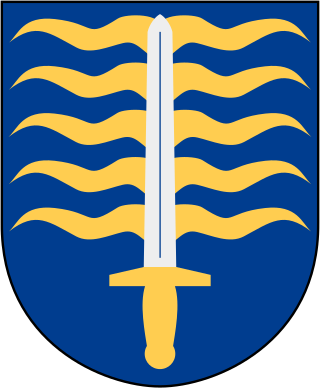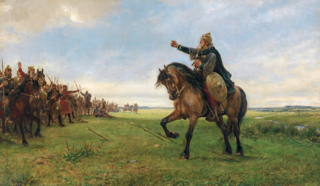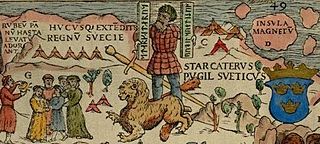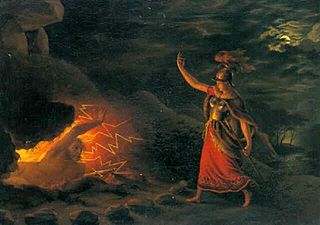
Tyrfing, also rendered as Tirfing or Tyrving, was a magic sword in Norse mythology, which features in the Tyrfing Cycle, which includes a poem from the Poetic Edda called Hervararkviða, and the Hervarar saga. The name is also used in the saga to denote the Goths.

Ivar Vidfamne was a semi-legendary king of Denmark, who originated in Scania. He apparently died circa 700 CE, in Karelia, at a place called Karjálabotnar, which may have been the modern Kurkiyoki, in Lakhdenpokhsky District of Russia.

Hlöðskviða, known in English as The Battle of the Goths and Huns and occasionally known by its German name Hunnenschlachtlied, is an Old Norse heroic poem found in Hervarar saga ok Heiðreks. Many attempts have been made to try to fit it with known history, but it is an epic poem, telescoping and fictionalising history to a large extent; some verifiable historical information from the time are place names, surviving in Old Norse forms from the period 750–850, but it was probably collected later in Västergötland.

The Battle of Brávellir or the Battle of Bråvalla was a legendary battle, said to have taken place c. 770, that is described in the sagas as taking place on the Brávellir between Sigurd Hring, king of Sweden and the Geats of Västergötland, and his uncle Harald Wartooth, king of Denmark and the Geats of Östergötland.

Starkad was either an eight-armed giant or the human grandson of the aforementioned giant in Norse mythology.

Hervarar saga ok Heiðreks is a legendary saga from the 13th century combining matter from several older sagas in Germanic heroic legend. It tells of wars between the Goths and the Huns during the 4th century. The final part of the saga, which was likely composed separately from and later than the rest, is a source for Swedish medieval history.

A shield-maiden was a female warrior from Scandinavian folklore and mythology.
Halfdan the Valiant was a legendary Scanian prince, who was the father of Ivar Vidfamne according to Hervarar saga, the Ynglinga saga, Njal's Saga and Hversu Noregr byggdist. The genealogical work Hversu Noregr byggdist gives his father as Harald the Old, his grandfather as Valdar and his great-grandfather as Hróarr.

Hjalmar and Ingeborg were a legendary Swedish duo. The male protagonist Hjalmar and his duel for Ingeborg figures in the Hervarar saga and in Orvar-Odd's saga, as well as in Gesta Danorum, Lay of Hyndla and a number of Faroese ballads. Hjalmar never lost a battle until meeting a berserker wielding the cursed sword Tyrfing.

Hervör is the name shared by two female characters in the Tyrfing Cycle, presented in The Saga of Hervör and Heidrek with parts found in the Poetic Edda. The first, the Viking Hervör, challenged her father Angantýr's ghost in his gravemound for his cursed sword Tyrfing. She had a son, Heidrek, father of the other Hervör. The second Hervör was a commander killed in battle with her brother.

Arngrim was a berserker, who features in Hervarar saga, Gesta Danorum, Lay of Hyndla, a number of Faroese ballads and Orvar-Odd's saga in Norse mythology.
Angantyr was the name of three male characters from the same line in Norse mythology, and who appear in Hervarar saga, Gesta Danorum, and Faroese ballads.

Hervararkviða, is an Old Norse poem from the Hervarar saga, and which is sometimes included in editions of the Poetic Edda.

Hlöd or Hlod was the illegitimate son of Heidrek, the king of the Geats, in Norse mythology.
Árheimar was a capital of the Goths, according to the Hervarar saga. The saga states that it was located at Danparstaðir, which is identified with the ruins of Kamjans'ke Horodyšče, near Kamianka-Dniprovska in southern Ukraine.

Gizur, Gizurr or Gissur was a King of the Geats. He appears in The Battle of the Goths and Huns, which is included in the Hervarar saga and in editions of the Poetic Edda. Gizur was the foster-father of Heidrek, who made a coup-d'état in Reidgotaland, the land of the Goths .
Guðmundr was a semi-legendary Norse king in Jotunheim, ruling over a land called Glæsisvellir, which was known as the warrior's paradise.
Munarvágr was a location on the southern shore of Samsø, which is mentioned in the legendary sagas Hervarar saga and Ragnar Lodbrok's saga.
Humli is a legendary king of the Huns who appears in the Hervarar Saga. He is the Grandfather of Hlod, illegitimate son of Heidrek, King of the Goths.
Sifka or Sifeca is a Hun princess in Norse mythology, the mother of the warrior Hlöd by Heidrek, King of the Geats.









